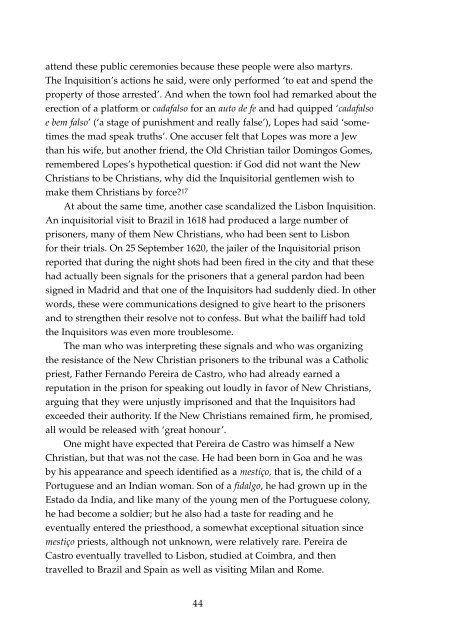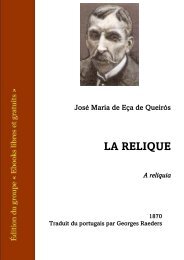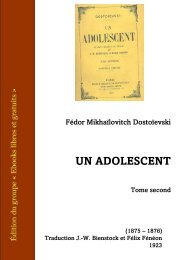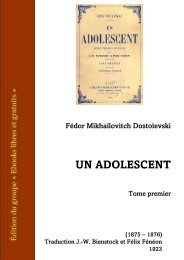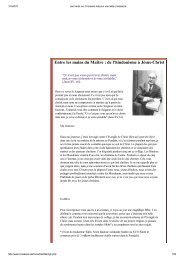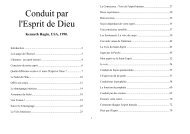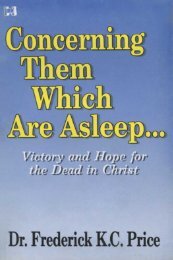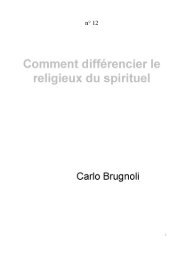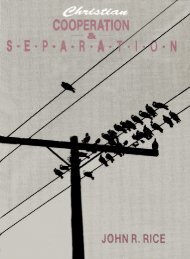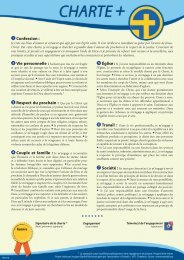The Expansion of tolerance
Create successful ePaper yourself
Turn your PDF publications into a flip-book with our unique Google optimized e-Paper software.
attend these public ceremonies because these people were also martyrs.<br />
<strong>The</strong> Inquisition’s actions he said, were only performed ‘to eat and spend the<br />
property <strong>of</strong> those arrested’. And when the town fool had remarked about the<br />
erection <strong>of</strong> a platform or cadafalso for an auto de fe and had quipped ‘cadafalso<br />
e bem falso’ (‘a stage <strong>of</strong> punishment and really false’), Lopes had said ‘sometimes<br />
the mad speak truths’. One accuser felt that Lopes was more a Jew<br />
than his wife, but another friend, the Old Christian tailor Domingos Gomes,<br />
remembered Lopes’s hypothetical question: if God did not want the New<br />
Christians to be Christians, why did the Inquisitorial gentlemen wish to<br />
make them Christians by force? 17<br />
At about the same time, another case scandalized the Lisbon Inquisition.<br />
An inquisitorial visit to Brazil in 1618 had produced a large number <strong>of</strong><br />
prisoners, many <strong>of</strong> them New Christians, who had been sent to Lisbon<br />
for their trials. On 25 September 1620, the jailer <strong>of</strong> the Inquisitorial prison<br />
reported that during the night shots had been fired in the city and that these<br />
had actually been signals for the prisoners that a general pardon had been<br />
signed in Madrid and that one <strong>of</strong> the Inquisitors had suddenly died. In other<br />
words, these were communications designed to give heart to the prisoners<br />
and to strengthen their resolve not to confess. But what the bailiff had told<br />
the Inquisitors was even more troublesome.<br />
<strong>The</strong> man who was interpreting these signals and who was organizing<br />
the resistance <strong>of</strong> the New Christian prisoners to the tribunal was a Catholic<br />
priest, Father Fernando Pereira de Castro, who had already earned a<br />
reputation in the prison for speaking out loudly in favor <strong>of</strong> New Christians,<br />
arguing that they were unjustly imprisoned and that the Inquisitors had<br />
exceeded their authority. If the New Christians remained firm, he promised,<br />
all would be released with ‘great honour’.<br />
One might have expected that Pereira de Castro was himself a New<br />
Christian, but that was not the case. He had been born in Goa and he was<br />
by his appearance and speech identified as a mestiço, that is, the child <strong>of</strong> a<br />
Portuguese and an Indian woman. Son <strong>of</strong> a fidalgo, he had grown up in the<br />
Estado da India, and like many <strong>of</strong> the young men <strong>of</strong> the Portuguese colony,<br />
he had become a soldier; but he also had a taste for reading and he<br />
eventually entered the priesthood, a somewhat exceptional situation since<br />
mestiço priests, although not unknown, were relatively rare. Pereira de<br />
Castro eventually travelled to Lisbon, studied at Coimbra, and then<br />
travelled to Brazil and Spain as well as visiting Milan and Rome.<br />
44


